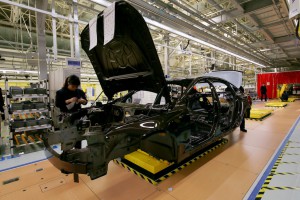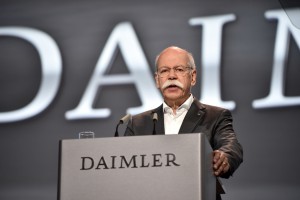Volvo may source engines from Daimler AG, raising the spectre of Mercedes-Benz and the Swedish-Chinese automaker forming some sort of official partnership in the near future.
The revelation comes mere weeks after Geely founder Li Shufu spent more than $9 billion to acquire a 9.69% stake in Daimler AG, and days after he said that partnerships between companies were critical to future growth. He also noted that companies that don’t team up are likely to be gobbled up.
Further than supplying engines, Manager Magazin in Germany reported the partnership could extend beyond that into a potential ownership stake in Volvo Cars of “a couple percent.”
Volvo declined to comment, and a Daimler spokesman said: “This is pure speculation, which we will not comment on.” Daimler Chief Executive Dieter Zetsche welcomed Li as a new shareholder in the wake of the acquisition of his stake. Zetsche said any alliance will depend on whether Daimler’s current China partner BAIC agrees.
(Geely’s Li Shufu says partnerships key to auto success. Click Here for the story.)
The Beijing Benz JV builds the majority of Mercedes models sold in China, including the long-wheelbase models developed for the country. It is about to launch a sedan version of the redesigned A-Class.
In the opinion piece written for German newspaper Frankfurter Allgemeine Zeitung, Li said that traditional carmakers could only survive far-reaching structural change in the automotive industry through enhanced cooperation.
“We must actively assess the possibility of comprehensive alliances, instead of hiding from reality by sticking our heads in the sand,” Li wrote. He added that “any legally-feasible bilateral and multilateral cooperation of mutual benefit” needed to be “discussed.”
(Geely Chairman shaking up auto industry. Click Here for the story.)
The opinion piece was widely interpreted by the German media as a sign that the new Daimler shareholder would play an active role in shaping the company’s future. Earlier, Li already added Volvo to his portfolio of vehicle brands and helped the struggling Swedish carmaker achieve a commercial turn-around.
Li said, according to the Chinese Xinhua News Agency, carmakers willing to face significant challenges, such as a need to pivot to self-driving and electric-powered technologies, could still benefit in the long-run. Companies “ready to unite to create digital platforms,” which can be used cooperatively by their diverse brands, would have a “recipe for success” in a “more and more embattled industry.”
He also emphasized the current transition phase would be a critical juncture for carmakers as they struggled to juggle competing goals of profitability and sustainability. Nevertheless, he expressed optimism that it would be possible to “use global economies of scale and reduce risks” on the one hand, while ensuring the “independence of brands” and “autonomy of management” on the other.
(To see more about Daimler AG’s CEO Zetsche’s talks about future with new investor, Click Here.)
Carmakers need to “wake up” to make the switch to a business model based more on sharing technology to generate acceptable returns in future. “Those companies sticking to silos will be swallowed up by the few remaining giants,” Li said. “Those who’ll bundle their shared strengths will win out in the future.”


